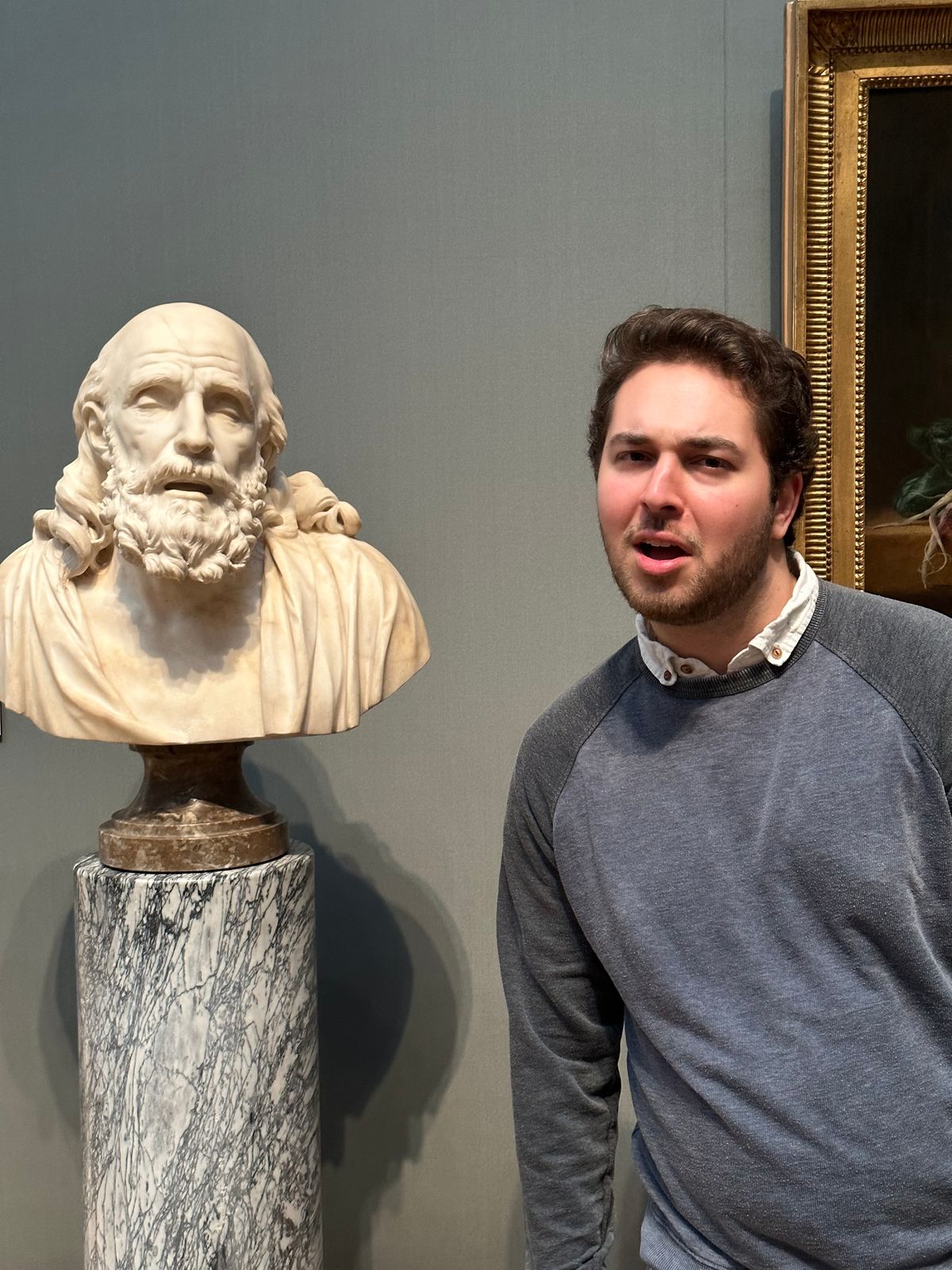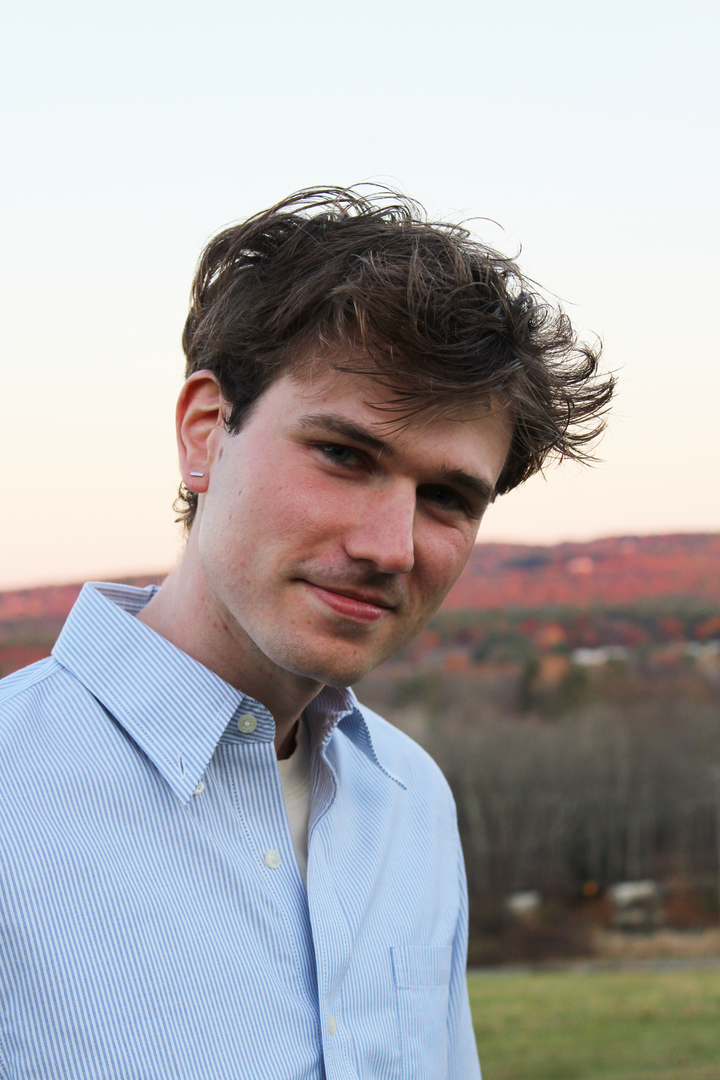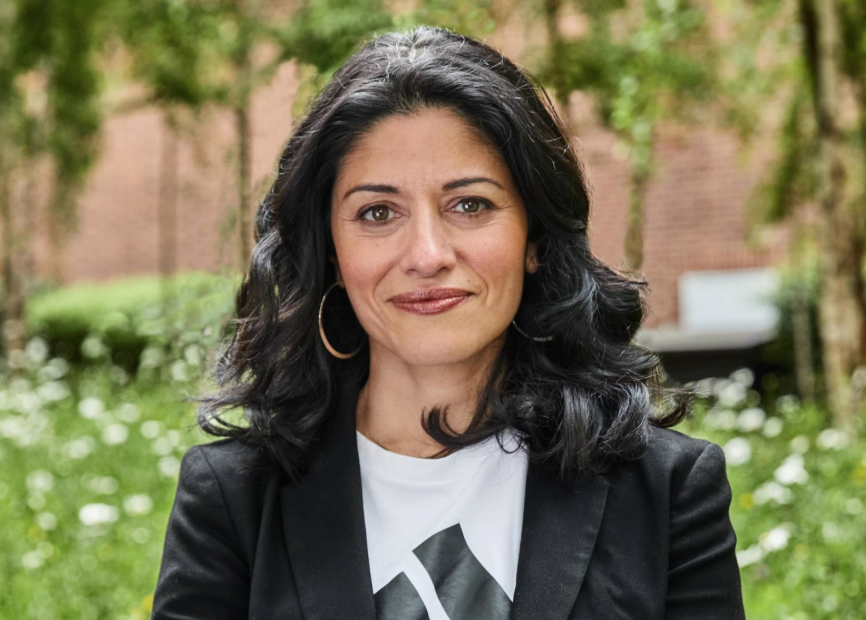Student Squared: Luke Herzog ’24
In this installment of Student Squared, Managing Features Editor Eleanor Walsh ’25 interviews the Gads director, ghost skeptic, and playwright Luke Herzog ’24. Luke discusses his recent play, monarch butterflies, upcoming projects, and more.

Luke Herzog ’24: Should we start by talking about how it’s very serendipitous that you drew my name randomly [because we’re friends]?
Eleanor Walsh ’25: We really should talk about that.
LH: I call foul play. I think you’re messing with it.
EW: Ok. That’s not going to go in. How’s the end of your semester going?
LH: It’s going well! I’m starting to realize that I’m halfway through my senior year and I’m a five-year senior because I took a Covid gap year. So I’ve been here a long time and involved with the community a long time. I’m starting to seek closure now. Saying goodbye to friends like you who are going abroad — that’s one of the most tragic parts of this month.
EW: Stop, it makes me sad. You are a five-year senior. How do you feel that shapes your perspective of the college?
LH: It’s interesting because I feel like I wouldn’t have wanted to maximize my time here as much if what had gone down hadn’t gone down.
EW: “Gone down” meaning Covid.
LH: Yeah. That’s my euphemism for Covid. When everything went down globally. And my personal path was I took a gap year after my freshman year and lived with several other people taking gap years. And for that first semester, we lived in Williamsburg, Virginia, of all places. None of us were from Virginia, but it was a weird series of events that led us there. My high school English teacher knew a family that was renting the house, and they got us a good deal. Long story short, we lived a couple blocks away from Colonial Williamsburg, which, you may or may not know, is a full on reenactment town. And it was the most incredible experience ever, because you hear horses in the distance and trumpets. Our next door neighbor was a blacksmith, the blacksmith of Colonial Williamsburg. He had a deal with the landlord to use our laundry machine so he dropped his tricorn hat and his tights into our machine. You’d see milkmaids driving Subarus… It was incredible. It was a very strange time with Covid and the election but also there’s Thomas Jefferson, and nothing made any sense.
EW: If you had to have a job at Colonial Williamsburg what would it be?
LH: I think I would want to be one of the people leading ghost tours. There are several ghost tours that walk around and they’re very spooky. They wear their cloaks and they carry lanterns and I feel like you can make up anything [doing that job].
EW: Do you believe in ghosts?
LH: This will be controversial. I don’t know if you should print this, but I do not believe in ghosts, and I feel like that’ll make a lot of your readers angry. I did once think I saw a ghost as a kid. But now I chalked it up to being an overly imaginative young boy.
EW: I’m kind of surprised you don’t believe in ghosts. I would expect, with your artistic spirit…
LH: I… Thank you? I believe in aliens. Is that enough? I think aliens almost have to be real. I think I have to see one. They’re probably not friendly like Casper. Actually, I hope they’re friendly like Casper.
EW: I recently saw a play that you wrote and directed and put on that was incredible. Can you tell people a little bit about what that was about, that process, how it went, etc.?
LH: It went great. I’m so grateful to the cast and crew. It was called “We Open on a Red Desert,” and the premise is that in the year 2037, just before a historic landing, NASA secretly hires six Hollywood writers to brainstorm the first words on Mars. So the whole thing took place in the writers room, with a bunch of big egos, or big Hollywood egos, pitching to NASA what they think the first words on Mars should be. And it was a wonderful cast. We rehearsed for two months. We were lucky enough that the theater department allowed us to use one of their spaces, so we were in Webster [Hall] studio three, and we got full use of the lights in that black box theater. I’m incredibly proud of how it turned out. I wrote it over winter break, and then tinkered with it over the summer. I’d be remiss to not mention that you were a beta reader on it. So there’s bias, there’s so much bias in this article. You have to publish this. This is not true journalism. This is a yellow journalism domain.
EW: They’re going to throw tomatoes at me. To me, “We Open on a Red Desert” is a very classic Luke Herzog play in terms of the writing style. I wanted to ask what your process was like, because you usually have very specific intelligent concepts and I want to know how you come to them.
LH: Thank you very much. I do think a lot of my writing lately comes from very specific small tidbits or factoids, and building off of that, or just small tiny premises. I think it’s hard to tackle something huge, like space travel, but I think it can be really compelling to just ask a single question like, “What should the first words on Mars be?” And if you start with that specificity, I think it can be fun to build off of that. I wrote a 10-minute play my freshman year, because I found out that the reason Lincoln was unguarded at the theater in this box when he was assassinated, is his regular bodyguard was replaced with this incompetent [Washington] D.C. cop, who wandered off during intermission to the tavern next door, and it just so happens that that is where John Wilkes Booth was waiting to assassinate the president. And so for the 10 minutes of intermission at Ford’s Theater, the bodyguard who wandered off and the would-be assassin were in the same place at the same time. They could have interacted. And that’s a great premise. And so I did a 10-minute play where they have a conversation, and the twist is that by the end, the bodyguard unknowingly convinces Booth to go through with it. What’s another example? You might remember, Eleanor, a one-act play called “Meteoric” which was inspired by finding out that many comedy clubs these days are confiscating cell phones. So then I thought, ‘Well, what if an emergency happens at a comedy show? Like a disastrous apocalypse is happening and no one knows except for the comedians backstage.’
EW: And know we did. You touched on the Lincoln play, and that’s obviously something that’s stuck with you, because you’re writing a thesis play about that same event, right?
LH: That’s right. I’m still struggling to think of a title for that. But yes, it’s an expansion of that play I wrote freshman year, which is another example of a full-circle, seeking-closure moment. It’s a series of those 10-minute or so vignettes with different characters somehow associated with the Lincoln assassination. None of them are Lincoln. Lincoln is not a character in the play.
EW: Lincoln would be tough to cast. Big shoes to fill.
LH: No one looks like Lincoln! No one on the planet looks like Abraham Lincoln.
EW: Do you ever base your characters off of people from your life?
LH: It was interesting doing historical play like this because you can get a lot of information about people’s lives, but their personalities… you basically just decide. At least that’s how I’ve been doing it; I don’t know how ethical it is. But you get to glean hints of [their personality] and then just expand or exaggerate it. … What’s fun is there’s a stable of actors at Amherst I now know at Amherst who I suspect might be interested in doing something I’ve written, so I can sort of write to people’s strengths. The one that comes to mind is Matt Vitelli [’24], who’s been in virtually everything I’ve ever written. He’s my best friend and I think the most talented actor Amherst has seen in quite some time.
EW: What about the medium of a play is compelling to you?
LH: I love theater because it’s the most collaborative form of writing. I’ve said this before, but you have to assemble a team. Every time you put together a play, there are things I can’t do. I can’t do sound design, I can’t do lighting design, I can’t stage manage. And then of course, there is a huge group and ensemble of actors who bring their own special talents and add their own little flair to their characters. And I love that aspect of it, how it really is a team process. Writing prose or poetry or something is incredibly lonely. That’s a singular activity. But if you’re in a writers room, or you’re writing something for the stage, it allows you to have something by yourself and then open it up to the world. And also, I hope this doesn’t come across as a little vain, but you can watch people react to your writing in theater, you can get real time reactions in a way you couldn’t with a short story or whatnot. And it’s really satisfying to hear people laugh, like okay, they actually came across the way I wanted it. I discovered my favorite feeling is if I make someone gasp.
EW: To move away from playwriting, where are you from and what’s something you love about that place?
LH: I’m from a small town called Pacific Grove, California on the central coast of California, the Monterey Peninsula — Monterey Bay. I’m very proud of my hometown. It’s a beautiful little spot that’s near Carmel and Big Sur. I was very lucky to grow up where I did. What I love about my town is that there are all sorts of community events. We’re called “Butterfly Town USA,” because monarch butterflies traditionally migrate through our town. Every year in the fall, there’s a town-wide parade with all the elementary school kids dressed as butterflies, and that is pretty cute. But now climate change is killing off all the monarchs so we’ve got like two more good years left to this parade. So… check it out! I mean, it’s sad. We have these beautiful butterfly groves, where you could go and look up and think it’s leaves on the tree and then their wings flutter and you realize that’s all butterflies. But fewer and fewer every year, and now it’s harder to find them. Isn’t that sad? Maybe don’t publish that.
EW: If you were to trade lives with someone at Amherst for the day, who would it be?
LH: This is a wild question. My mind immediately went to Michael Elliott. I think what I love about what he’s been doing is he’s so visible. I see him in the dining hall every other day. And I think it’s just wonderful how it feels like he’s just sitting down with students in a way that I think is really refreshing. But it would also be fun to just wander around as the average president, and wave and wield my power…
EW: What else are you involved in on campus?
LH: I should definitely mention Mr. Gad’s House of Improv. I’m lucky enough to be director this year. One of the biggest shifts I’ve seen over my five years associated with Amherst is to see Mr. Gad’s really grow into a little bit of a phenomenon. We perform every Monday night and my freshman year I remember there being audiences of maybe 20 or 30 students. It’s unusual now to have a show with sub 100 students and we’ve had several pushing 200. It’s been just a wonderful group of people. It’s what kept me connected to Amherst when I took my gap year because we had those Zoom shows, which were just as awful as they sound. I wish we recorded them. There’s nothing more painful than doing improv in separate places without laughter, without feeling or seeing the audience. It feels like screaming into the void. So it felt amazing when we got back. And I wonder if it’s a combination of feeling that release when we finally were able to perform for the audience, and also audiences looking to laugh after what had been a really rough patch. It’s been kind of remarkable. It’s the highlight of my whole experience. There’s no room I love more than the Friedmann room on Monday nights. It’s going to be really, really hard to say goodbye to.
It’s existed since 1989, and there’s a huge network of alums who have gone on to do some wonderful things. There’s a big group chat of Gad’s alumni. There’s Zach Cherry [’10], who’s the main character in that show Severance. Dan Cluchey [’08], who went on to be a Biden speechwriter. Stand-up comedians like Catherine Lindsay [’19] and Kate Sisk [’14]. Kate Sisk just had a Comedy Central special. It’s really cool to see this network of comedy writers and comedians spring out of such a small group from a small school.
EW: Do you feel like doing improv makes you a better writer?
LH: I don’t know. I hope so. It’s almost like freeform writing. It’s writing on the fly. It’s writing in a pinch. You know, I took a personality psych class a few semesters ago and as a project for it I had everyone in Gad’s do a personality test. Wildly different personalities, as you might imagine, but there was one uniting factor. It wasn’t extraversion, like many people would think, it wasn’t creativity or something like that. It was openness to experience. And something about that rang true to me. What’s awesome about improv is just a willingness to ‘Yes, and’ and maybe, potentially make a fool of yourself, but do it together with other people.
EW: I’m very moved by that. Anything else you want to shout out that you do?
LH: Another thing I’ve really enjoyed doing is having this WAMH show with the aforementioned Matt Vitelli ’24. And it’s called “Take It As You Will with Matt and Luke.” I have this book I inherited from my father from the 1980s called “The Book of Questions,” which is filled with wacky, would you rather hypotheticals. And we answer a few of those questions every episode and see where the conversation takes us. Eleanor has been the most frequent guest on the show. More bias.
EW: Do you have anything you’d like to say to the Amherst community as you go into your final semester here?
LH: I feel very grateful. I’m going to miss so many friends. I hope I stay connected. I’m sort of becoming frantic about ensuring that I don’t lose connections with people. I am grateful to several different professors. I had this real worry in my freshman and sophomore year that I wasn’t connecting with professors in a meaningful way that I wasn’t creating connections that would last and I was very happy to be proven wrong in my upperclassmen years. Shout out to professors like [European Studies, Spanish, and Latinx and Latin American Studies] Professor [Ilan] Stavans and [English] Professor [Christopher] Grobe and [Law, Jurisprudence and Social Thought] Professor [Michaela] Bragan and [English] Professor [Geoffrey] Sanborn and [English and Film and Media Studies] Professor [Amelie] Hastie. I’m definitely going to forget someone.





Comments ()